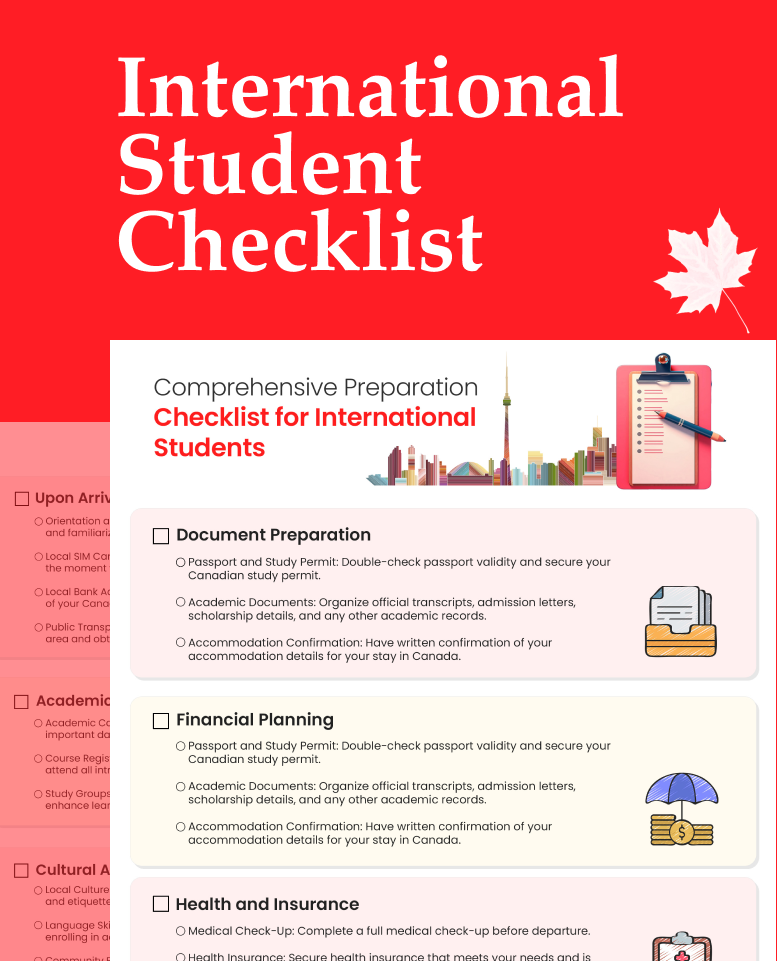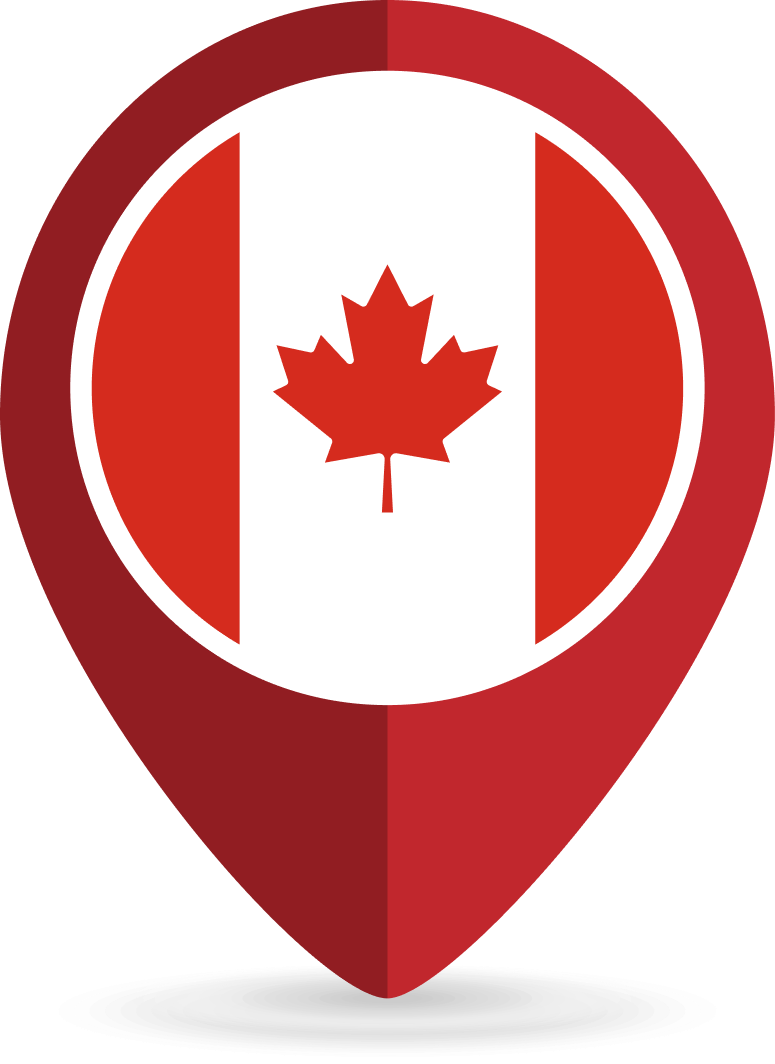Masters in Canada – Best Universities, Courses, Cost, Eligibility Criteria & Jobs
Canada has established itself as a prominent global player in higher education, attracting over 200,000 international students. Renowned for its world-class institutions, commitment to academic excellence, multicultural environment, and breathtaking landscapes, Canada’s appeal to international students continues to rise. This allure has led many postgraduate students to consider pursuing their Master’s in Canada.
Why choose Masters in Canada?
Considering a Master’s in Canada opens doors to a myriad of advantages, blending academic excellence with personal growth. Here’s why exploring a Master’s degree in Canada can be a fulfilling educational journey:
- Global Perspective: Canada prides itself on being a global melting pot, with over 200 nationalities contributing to its diverse student body. Engaging with peers from various backgrounds provides a unique worldwide outlook, fostering understanding and collaboration. The multicultural environment ensures an enriching experience beyond the academic scope.
- Government Policy Support: Canada’s commitment to higher education is reflected in significant government investment in the tertiary education sector. This positions Canada among the forefront countries, showcasing robust state backing for higher education. This investment translates into cutting-edge research opportunities, top-notch infrastructure, and a conducive learning environment.
- Post-Study Opportunities: Upon completing your Master’s in Canada, you become eligible for a post-graduation work permit. This invaluable opportunity allows you to work in the country for the same duration as your study program, providing practical exposure and potentially paving the way for long-term career prospects.
- Quality of Life and Safety: Canada consistently ranks high in global quality of life indices. Choosing Canada for your Master’s ensures a world-class education and grants access to an exceptionally high standard of living. Moreover, Canada is celebrated for its safe and stable environment, providing a secure backdrop for focused and stress-free academic pursuits.
- Bilingual Opportunity: As a multicultural nation with English and French as official languages, Canada offers a unique bilingual experience. For international students, this presents an opportunity to immerse themselves in a new language or refine existing language skills, contributing to a well-rounded educational experience.
Top universities for Master’s in Canada
With its renowned universities and diverse range of programs, Canada is a sought-after destination for pursuing Master’s degrees. Here are some of the top universities to pursue Master’s in Canada:
| University | QS World Ranking 2024 | THE Ranking 2024 |
|---|---|---|
| University of Toronto | #21 | #21 |
| McGill University | #30 | #49 |
| University of British Columbia | #34 | #41 |
| University of Alberta | #111 | #109 |
| University of Waterloo | #112 | #158 |
| Western University | #114 | #201-250 |
| University of Montreal | #141 | #111 |
| University of Calgary | #182 | #201-250 |
| McMaster University | #189 | #103 |
| University of Ottawa | #203 | #177 |
Eligibility Criteria for Master’s in Canada for Indian Students
Pursuing a Master’s in Canada offers a wealth of opportunities, but understanding the eligibility criteria is crucial. While specific requirements may vary among institutions and programs, here are the general criteria for Indian students:
- Educational Background:
- A minimum of 16 years of educational experience is typically required for Master’s programs in Canada. This often translates to a four-year bachelor’s degree or its equivalent.
- A minimum Grade Point Average (GPA) of 3.0 (on a scale of 4.0) in your bachelor’s degree is commonly expected. Some institutions may have specific GPA requirements for certain programs.
- If you have a three-year bachelor’s degree, some institutions may accept it with a minimum of 15 years of educational experience.
- English-Language Proficiency:
- Proficiency in English is a crucial requirement. Most universities accept results from English-language proficiency tests such as IELTS. A minimum overall score of 6.5 is a common benchmark, but this may vary slightly among institutions.
- GRE Scores:
- For programs in engineering and science, some institutions may require submission of GRE (Graduate Record Examination) scores. A minimum score of 260 is a typical requirement, although this can vary.
- GMAT Scores (for Management Programs):
- For Master’s in Management areas such as MBA in Canada, Finance, and Accounting, many business schools may require the GMAT (Graduate Management Admission Test). A minimum score of 650 is often expected.
It’s important to note that these are general guidelines, and students should verify specific requirements with the chosen institution and program. Additionally, some programs may have additional prerequisites or specific criteria, so applicants are encouraged to carefully review the admission guidelines provided by the respective universities.
Cost of Pursuing a Master’s in Canada: A Budget Overview
Canada is recognized for its affordability for international students, offering competitive tuition fees compared to other English-speaking nations. Generally, the cost of Master’s programs in Canada can range from CAD 17,000 to CAD 30,000. However, it’s essential to note that specific factors, including the chosen field of study, can influence the overall cost.
- Arts and Humanities-Based Courses:
- Programs in arts and humanities are often on the lower end of the cost spectrum. Students pursuing Master’s degrees in these fields can typically expect tuition fees toward the lower range of CAD 17,000 to CAD 25,000.
- Specialized Programs:
- For specialized fields like Dentistry, Architecture, and Business, the cost may be on the higher side. Tuition fees for these programs might range from CAD 25,000 to CAD 30,000 or more.
Additional Considerations:
- Living Expenses: In addition to tuition fees, students need to consider living expenses, including accommodation, food, transportation, and other personal costs. On average, living expenses can range from CAD 10,000 to CAD 15,000 per year.
- Health Insurance: International students in Canada are required to have health insurance. This cost varies, but it is typically around CAD 600 to CAD 800 per year.
- Books and Supplies: Budgeting for books and supplies is essential. This can vary based on the program, but an estimate is around CAD 1,000 per year.
Scholarships for Master’s in Canada
Canadian universities and colleges extend a diverse array of scholarships, grants, and bursaries to assist deserving international students in financing their Master’s studies. Additionally, the Canadian government, along with various public and private entities, offers additional financial aid options. It is imperative for prospective applicants to thoroughly examine the eligibility criteria and adhere to application deadlines for these scholarships. Taking a strategic approach to leverage these financial aid opportunities can significantly contribute to making a Master’s degree in Canada more financially feasible.
Best Master’s courses in Canada
| Field of Study | Top Universities Offering the Program |
| Computer Science | University of Toronto, University of British Columbia |
| Business Administration | University of British Columbia, University of Toronto |
| Engineering | University of Waterloo, University of Toronto |
| Public Health | University of Toronto, University of British Columbia |
| Environmental Science | University of Alberta, Simon Fraser University |
| Economics | University of Toronto, University of British Columbia |
| Psychology | University of British Columbia, University of Toronto |
| Data Science | University of British Columbia, University of Toronto |
| Biotechnology | University of Toronto, University of British Columbia |
| Political Science | University of Toronto, McGill University |
Career Opportunities after Masters in Canada
Completing a Master’s degree in Canada opens doors to a variety of job opportunities across different industries. The Canadian job market, known for its strong demand for skilled professionals, offers favorable prospects for international graduates. Depending on your field of study, you can explore employment options in sectors like technology, healthcare, engineering, finance, business, and more. Graduates may find positions in multinational corporations, government organizations, research institutions, or even start their own ventures. Active networking, internships, and utilizing university career services can significantly enhance job prospects. Here are some popular job roles that graduates often pursue in Canada:
| Job Role | Industry/Field |
| Business Analyst | Business/Technology |
| Project Manager | Various Industries |
| Data Scientist | Technology/Analytics |
| Software Engineer | Information Technology |
| Financial Analyst | Finance/Banking |
| Marketing Manager | Marketing/Advertising |
| Human Resources Manager | Human Resources |
| Research Scientist | Scientific Research/Innovation |
| Healthcare Administrator | Healthcare/Management |
| Environmental Consultant | Environmental Science/Consulting |

Download your International Student checklist
Post-Graduate Work Opportunities after MS in Canada
Canada is a preferred destination for international students, known for its welcoming atmosphere and promising post-study work opportunities. Securing a Canadian work permit is a significant advantage, providing students with valuable work experience and expanding their career prospects globally. This permit enables international students to work full-time in Canada for up to four years after completing their post-graduation (PG) degree. This opportunity is invaluable for career development and exploration in Canada’s diverse and thriving job market.
Seamless Connectivity with CanadianSIM for International Students
In the pursuit of academic excellence in Canada, staying connected is pivotal, and CanadianSIM understands this need. Whether you are an international student starting a Master’s journey or a newcomer to Canada, CanadianSIM ensures you are connected from the moment you land. Offering a Canadian SIM card and phone number prior to your departure, CanadianSIM provides a hassle-free solution for staying in touch with friends, family, and the professional world. Their no-contract postpaid plan includes enticing features such as unlimited Canada-wide calls, unlimited local and international text messaging (SMS), caller ID, voicemail, and eSIM readiness. With countrywide coverage, this service aligns seamlessly with the dynamic and diverse Canadian scenario, complementing the opportunities that come with pursuing a Master’s degree in this vibrant country. Stay connected, explore your new academic journey, and navigate your career path with CanadianSIM.
Related Posts



















